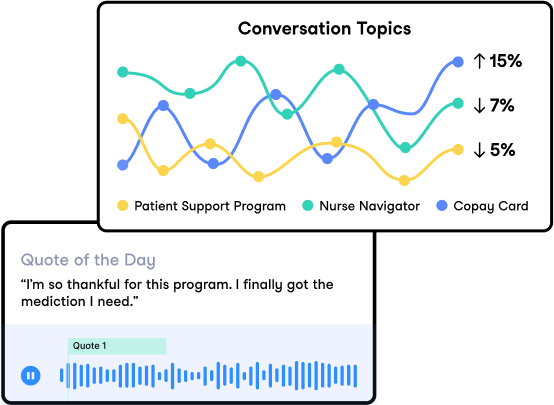
Act on insights with patient adherence solutions
Healthcare is complex (and confusing to your patients). Conversational analytics listens to patient interactions already happening and offers actionable insights. to improve your healthcare patient experience.
Start ListeningAuthenticx analyzes customer conversations to surface recurring trends.
Healthcare is changing and so are your patients.
Are you adapting your strategy? Centralize and streamline your data to understand the context around critical errors, high-risk events, and unexpected patient disruptions.
Read the Case Study
Patient Adherence Solutions
Patient adherence solutions are a set of strategies, tools, and interventions designed to ensure that patients follow their prescribed medical regimens, such as taking medications as directed and attending appointments. These solutions aim to improve patient compliance with medication and other treatment recommendations, ultimately leading to better health outcomes and reduced healthcare costs.
A key element of patient adherence solutions involves understanding the definition of medication non-adherence, which is when patients do not take their medications as prescribed, either intentionally or unintentionally. The consequences of non-adherence can be severe, as it may lead to treatment failure and higher healthcare costs. As such, patient adherence solutions play a crucial role in enhancing patient outcomes.
In terms of how to improve patient compliance with medication, compliance packaging programs are a great option. A compliance packaging program is a program used to create compliance packaging, or customized medication packaging designed to help patients take their medications correctly and consistently.
This type of packaging typically organizes medications into individual compartments or blister packs labeled with specific information such as the date, time, and dosage instructions. By simplifying the medication administration process, compliance packaging programs can increase patient adherence and minimize the risk of medication errors.
Other patient adherence solutions encompass a wide range of interventions, including:
- Patient education and counseling: Providing clear and concise information to patients about their medical conditions, treatment plans, and potential side effects can improve their understanding of the importance of adherence. Health professionals may use various methods, such as written materials and face-to-face counseling, to ensure that patients fully comprehend their treatment recommendations.
- Medication therapy management (MTM): Pharmacists and other healthcare professionals can offer MTM services, which involve a comprehensive review of a patient’s medication regimen, to identify and resolve any potential issues related to non-adherence. MTM services include things like medication reconciliation, dosage optimization, and patient counseling.
- Digital tools: Electronic health records, smartphone applications, and text message reminders can help patients track their medication schedules and remember to refill prescriptions. Additionally, telehealth services can enable remote monitoring and consultation, further supporting adherence.
- Support systems: Engaging family members, caregivers, and peer support networks can help patients overcome barriers to adherence. These support systems can provide practical assistance and emotional support, reinforcing the importance of compliance with treatment recommendations.
- Financial assistance: Programs offering financial support or assistance in obtaining medications can help address cost-related barriers to adherence.
Patient Support
Patient support is vital to improving adherence to treatment plans and medication regimens. It encompasses a range of services and interventions to assist patients in managing their medical conditions and complying with their prescribed therapies. Proper support addresses various barriers to adherence, such as lack of knowledge, emotional challenges, and logistical issues.
There are several types of patient support services and patient hub services providers available today. These services cater to the unique needs of patients and offer personalized assistance to ensure optimal adherence to treatment plans. Here’s a quick look at what patient support services and related programs entail:
- Patient support services: These services include various interventions, such as educational materials, counseling, and medication reminders, to help patients understand their conditions and adhere to their treatment plans. Patient support services may be provided by healthcare professionals, such as pharmacists, nurses, or social workers, and can be delivered through a wide range of channels.
- Patient support program: A patient support program is a coordinated set of services designed to address specific needs and challenges faced by patients with chronic or complex medical conditions.
- Patient hub services providers: The term “patient hubs” is commonplace in healthcare today. But what is a patient hub? A patient hub is a specialized organization that offers a comprehensive suite of services to support patients, healthcare providers, and pharmaceutical manufacturers. Patient hub service providers play a critical role in what is known as a pharmaceutical hub or patient hub. So what is a pharmaceutical hub, or what are hub services in pharma? Basically, these hubs serve as central points for coordinating and delivering patient support services.
Patient hub data is critical for monitoring and evaluating the effectiveness of patient support services. By collecting and analyzing data on patient engagement and adherence, healthcare providers and pharmaceutical manufacturers can identify areas for improvement and tailor their interventions to better meet the needs of those they serve.
Medication Management Solutions
Medication management solutions aim to improve medication adherence by helping patients take their medications as prescribed, minimizing the risk of errors, and optimizing therapeutic outcomes. These solutions play a crucial role in enhancing patient safety and overall health outcomes by addressing various barriers to medication adherence.
They encompass medication adherence tools, medication adherence solutions, and medication management products, which cater to the diverse needs of patients and healthcare providers.
- Medication adherence tools: These devices assist patients in adhering to their medication regimens. Examples include pill boxes with compartments for different days or times and electronic pill dispensers with alarms or notifications. They can help patients organize their medications and remember to take them when they are supposed to.
- Medication adherence solutions: These are strategies and interventions designed to address the root causes of non-adherence and promote better compliance with medication plans. They include educational programs, counseling services, medication therapy management, and more. Medication adherence solutions can be delivered both in-person and digitally online. Strategies to improve medication adherence include informative presentations and other educational materials that can provide valuable insights and tips for overcoming common challenges related to medication adherence.
- Medication management products: Medication management products help healthcare providers and patients manage medications more effectively. Automated dispensing machines and medication administration systems that reduce the risk of errors are two popular examples of these types of products.
- Medication technology: Advancements in medication technology have contributed significantly to the development of innovative medication management solutions. Examples of medication technology include smart pill bottles that send reminders to patients and wearable devices that monitor vital signs and medication intake. These technologies can improve patient engagement and provide real-time data on medication adherence and health outcomes.
How It Works
Gain a deeper level understanding of contact center conversations with AI solutions.
See a PreviewAggregate
Pull customer interaction data across vendors, products, and services into a single source of truth.
Analyze
Collect quantitative and qualitative information to understand patterns and uncover opportunities.

Activate
Confidently take action with insights that close the gap between your organization and your customers.
Medication Adherence Importance
The true medication adherence importance lies in its direct impact on the effectiveness of treatment plans, patient safety, and the overall efficiency of healthcare systems. Poor medication adherence can lead to suboptimal therapeutic outcomes, while proper adherence tends to result in better health outcomes.
Adherence also plays a vital role in cutting healthcare costs, as it prevents unnecessary hospital admissions, emergency department visits, and the need for more aggressive treatments. Several factors contribute to poor medication adherence, including patient affordability, complex medication regimens, lack of understanding about the treatment plan, and side effects.
Here are some of the factors that contribute to adherence—or the lack thereof.
- Patient affordability: High medication costs can be a major roadblock to adherence. Ensuring that medications are affordable to patients is crucial for improving adherence rates. Financial assistance programs, insurance coverage, and cost-effective medication alternatives may be required to help patients access their prescribed treatments.
- Adherence packaging: Customized packaging solutions like blister packs and pill organizers, can simplify the medication administration process and improve adherence. Adherence packaging typically organizes medications into individual compartments labeled with specific information such as the date, time, and dosage instructions. This makes it easier for patients to take their medications correctly and consistently.
- Medication synchronization: Medication synchronization is a pharmacy service that coordinates patients’ medication refills so they can pick up all their prescriptions on the same day each month. This service helps streamline the medication management process and reduce the risk of missed doses.
Patient Adherence Examples
Patient adherence solutions cover a wide range of strategies and tools designed to improve patients’ compliance with their prescribed medical regimens. For example, one of the most simple solutions is to designate a specific place where prescriptions are hung. This visual reminder helps patients remember to take their medications and follow their treatment plans.
Patients can also take advantage of specialty pharmacy hub services, which offer comprehensive support services. These services often include patient education, medication therapy management, and financial assistance. They are among the most prominent patient adherence examples due to their effectiveness.
Adherence packaging pharmacy services can also lead to improved adherence. Blister packing is one of the most useful forms of packaging. It sorts medications into compartments labeled with relevant information, which allows patients to quickly and easily find what they need. The benefits of blister packaging for medications are extensive and help to enhance patient outcomes.
When managing patient compliance, having access to specialized healthcare software can be equally beneficial. By leveraging data from patient interactions, Authenticx’s solution can provide valuable insights into the effectiveness of existing adherence solutions and highlight areas where additional support or interventions may be needed.
For instance, an organization could use the software to evaluate the impact of specialty pharmacy hub services on medication adherence for a specific patient population. By analyzing patient feedback and outcomes data, healthcare providers can identify which hub services are most effective in improving adherence and adjust their approach accordingly.
While patient adherence can be challenging on multiple fronts, platforms like Authenticx allow companies to dig deeper into their data and analyze patient voices to spot and address areas of concern. This ultimately allows them to provide better care to those that may be struggling to adhere to treatment regimens.